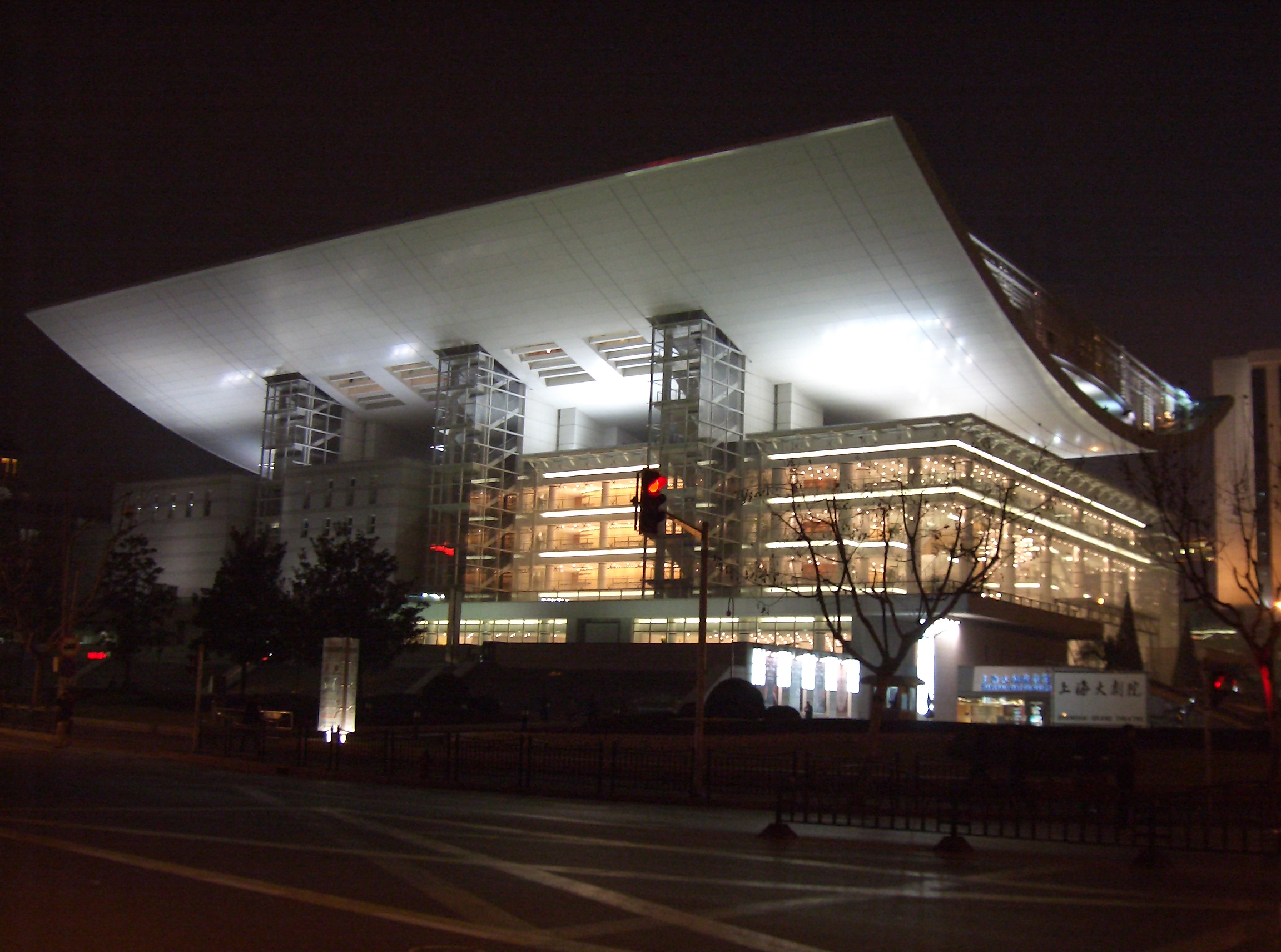Shanghai Opera House on:
[Wikipedia]
[Google]
[Amazon]
 Shanghai Opera House (;
Shanghai Opera House (;
Shanghainese
The Shanghainese language, also known as the Shanghai dialect, or Hu language, is a variety of Wu Chinese spoken in the central districts of the city of Shanghai and its surrounding areas. It is classified as part of the Sino-Tibetan langua ...
: ''Zånhae Kujihyoe'') is the official government-funded western-style opera company of Shanghai
Shanghai, Shanghainese: , Standard Chinese pronunciation: is a direct-administered municipality and the most populous urban area in China. The city is located on the Chinese shoreline on the southern estuary of the Yangtze River, with the ...
, China
China, officially the People's Republic of China (PRC), is a country in East Asia. With population of China, a population exceeding 1.4 billion, it is the list of countries by population (United Nations), second-most populous country after ...
, and the resident opera company at the new Shanghai Grand Theatre (上海大剧院 ''Shanghai Da Juyuan''). Although the term "Opera House" is often applied to the building, both in English and Chinese texts, officially the building is not an opera house and the term "Shanghai Opera House" properly applies only to the performing company, not the building, as is also true for its senior sister company, the China National Opera House (CNOH) in Beijing
Beijing, Chinese postal romanization, previously romanized as Peking, is the capital city of China. With more than 22 million residents, it is the world's List of national capitals by population, most populous national capital city as well as ...
. The reason for the distinction is found in that the Chinese character ''Yuan'' (院) applies primarily to a school or institute or dramatic troupe rather than the building in which a school, institute or dramatic company resides.
The offices, practice rooms and small rehearsal theatre are located at No.10 100- lòng Changshu Road, Jing'an District
Jing'an District () is one of the central districts of Shanghai. In 2020, it had 975,707 inhabitants in an area of .
The district borders the Hongkou, Shanghai, Hongkou to the east, Huangpu, Shanghai, Huangpu to the east and south, Putuo, Shangh ...
, Shanghai.
Repertoire
The repertoire of the opera company includes various western works: '' Aida,L'Elisir d'Amore
''L'elisir d'amore'' (; ''The Elixir of Love'') is a (comic melodrama, opera buffa) in two acts by the Italian composer Gaetano Donizetti. Felice Romani wrote the Italian libretto, after Eugène Scribe's libretto for Daniel Auber's (1831). ...
, Orfeo ed Euridice, Eugene Onegin (opera)
''Eugene Onegin'' (, ), Op. 24, is an opera (designated as "lyrical scenes") in 3 acts (7 scenes), composed by Pyotr Ilyich Tchaikovsky. The libretto, organised by the composer himself, very closely follows certain passages in Alexander Pushkin ...
, Otello
''Otello'' () is an opera in four acts by Giuseppe Verdi to an Italian libretto by Arrigo Boito, based on William Shakespeare, Shakespeare's play ''Othello''. It was Verdi's penultimate opera, first performed at the La Scala, Teatro alla Scala, M ...
, Pelléas et Mélisande (opera), The Nose (opera), Die Fledermaus
' (, ''The Bat'', sometimes called ''The Revenge of the Bat'') is an operetta composed by Johann Strauss II to a German libretto by Karl Haffner and Richard Genée, which premiered in 1874.
Background
The original literary source for ' was ...
, Les Pêcheurs de Perles
' (, ''The Pearl Fishers'') is an opera in three acts by the French composer Georges Bizet, to a libretto by Eugène Cormon and Michel Carré. It was premiered on 30 September 1863 at the Théâtre Lyrique in Paris, and was given 18 performan ...
, Samson et Dalila
''Samson and Delilah'' (), Op. 47, is a grand opera in three acts and four scenes by Camille Saint-Saëns to a French libretto by Ferdinand Lemaire. It was first performed in Weimar at the (Grand Ducal) Theater (now the Staatskapelle Weimar) on 2 ...
, La Traviata, I Pagliacci, L'amour des Trois Oranges.''
Its repertoire of Chinese-language western-style operas (''dangdai geju'') includes: '' White-Haired Girl'', '' Zan Yuen'' ("broad grasslands"), '' Fangcaoxin'' ("Fangfang, heart of grass"), '' Red Guards on Honghu Lake'', '' Sister Jiang'', ''Leiyu'' (based on Cao Yu's play ''Thunderstorm
A thunderstorm, also known as an electrical storm or a lightning storm, is a storm characterized by the presence of lightning and its acoustics, acoustic effect on the Earth's atmosphere, known as thunder. Relatively weak thunderstorm ...
''), ''Shangshi'' ("Mourning" 1981 folk opera based on a story by Lu Xun
Lu Xun ( zh, c=魯迅, p=Lǔ Xùn, ; 25 September 188119 October 1936), pen name of Zhou Shuren, born Zhou Zhangshou, was a Chinese writer. A leading figure of modern Chinese literature, he wrote in both vernacular and literary Chinese as a no ...
) and '' The Savage Land''.Encyclopedia of Contemporary Chinese Culture –
Page 420 Edward L. Davis – 2012 "Jin Xiang's style is characterized by a particular sensibility for musical colouring. His opera The Savage Land (Yuanye, 1987) features a Chinese-style verismo, reminiscent of Russian opera but at the same time permuted by distinctly Chinese ..."
See also
Shanghai Opera TheaterReferences
{{authority control Year of establishment missing Culture in Shanghai Tourist attractions in Shanghai Chinese opera companies Organizations based in Shanghai